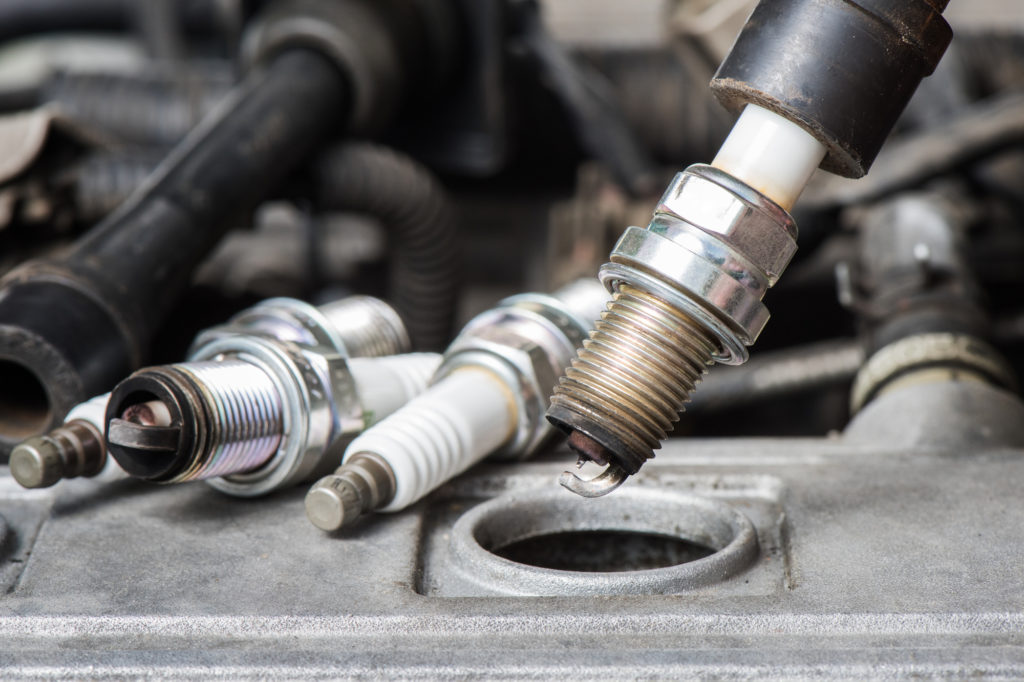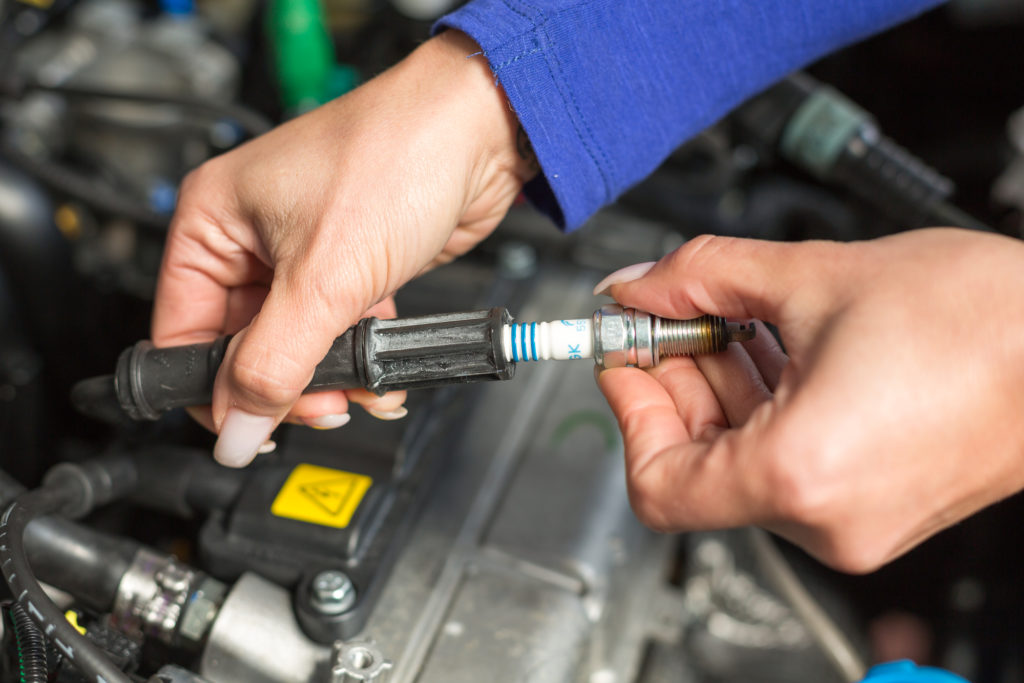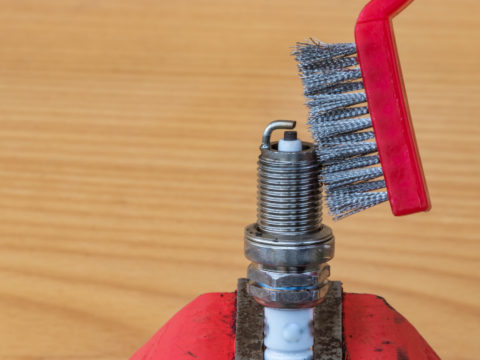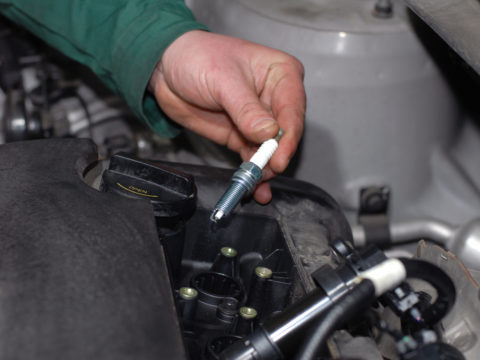Though it might seem like a simple technology, the humble spark plug is a necessary catalyst that allows your car engine to run.
You might not think about spark plugs very often, but when they malfunction, you will not be able to ignore faulty spark plugs for very long.

Essentially, a spark plug functions to aid in the combustion process. An ignition coil uses a high voltage level of electricity, which harvests a spark from the spark plug.
This spark ignites the fuel that comes from your gas tank through the air intake system and cylinders. Fuel mixes with the air before the spark plug ignites. That creates a small explosion in the spark channel, powers the engine, and propels the car’s movement.
This happens rapidly, think a thousand times per minute, throughout the entire lifecycle of a spark plug. If a spark plug is somehow damaged or faulty, a car will not run because it is missing the spark needed to power a combustion engine.
Contents
Symptoms of Bad Spark Plugs
Your check engine light will turn on when you have faulty spark plugs, but that warning could point to lots of potential engine trouble.
Here are a few more detailed symptoms of bad spark plugs you might experience if you need to replace the ones in your car.
1) Your Car Has Issues Starting Up
When you have trouble getting your car started after it has been sitting for a while you could be dealing with bad spark plugs.
If even one of your spark plugs is faulty, it can make it difficult for all your car’s cylinders to fire at once. When this happens, your car can have trouble starting. Busted spark plugs might make your car stall when you try to put the key in the ignition.
If the car cannot start at all, this is usually a symptom of a bad battery.
2) Motor Misfires
Even if you can get your car started, bad spark plugs can hinder your engine performance and cause it to misfire or hesitate while running.
Misfires happen when one or more cylinders in a car’s engine are not producing the necessary combustion power for it to run.
If the combustion process in your engine is affected by faulty spark plugs, they will cause a significant loss of power for the engine and make it impossible to experience a smooth ride in your car.
3) Rough Engine Idling
An engine that is running well will purr quietly when your car is idled. If you hear your engine pinging or rattling while you’re stopped at a red light, faulty spark plugs might be the culprit.
Delayed sparks from bad spark plugs make it much more difficult for your engine to idle as it was designed, especially when it’s been parked for more than a few hours.
Weather conditions like excessive coldness and wetness can also exacerbate the issue. You might even hear a knocking noise to feel the car visibly vibrating when the spark plugs are faulty.
If your spark plugs are working properly, your engine shouldn’t make any strange noises; it should sound steady and smooth.
4) Problems With Acceleration
If you don’t have problems with starting your car or don’t notice any issues when it’s idle, you might notice that it’s much harder to reach higher speeds when your engine has bad spark plugs.
A faulty spark plug might cause an engine to perform sluggishly and could make acceleration difficult for you. If you notice that it isn’t as responsive to your foot on the gas pedal, you might be looking at worn-out or damaged spark plugs.
5) Reduced Gas Mileage
No one ever wanted to spend a fortune at the gas station, and gas mileage is one of the most important factors for buyers choosing vehicles today.
If you start to notice that your car is going through gas quicker and quicker, you could be facing faulty spark plugs in your engine. If they aren’t functioning properly, you can quickly notice how much more money you’re spending on fuel.
When an engine has bad spark plugs it will consume more and more fuel. This happens because the engine becomes less and less capable of efficient combustion and needs more gas to run, meaning you’ll be shelling out more money in the long run.
You might even find your fuel efficiency reduced by up to 30 percent, according to the National Institute for Automotive Service Excellence.
How Often Should You Change Spark Plugs?
Like most other engine maintenance issues, it’s best to refer to your Manufacturer’s Suggested Maintenance Schedule. You can review your car’s unique maintenance schedule to know when they recommend replacing your spark plugs.
Luckily for most people spark plugs have long life cycles of about 80,000 miles. You’ll get quite a bit of get-up-and-go before they need to be replaced.

What Happens if You Never Change Spark Plugs?
While you might be tempted to ignore these symptoms and hope for the best, you could ultimately experience significant engine damage if you go that route.
When you continue to drive your car on faulty spark plugs, you might end up shelling out lots of money to fix problems that can easily be solved by replacing old or damaged spark plugs instead.
Where Are Spark Plugs Located?
Spark plugs fit inside your cylinder head, near the ignition coil.
When locating the placement of your spark plugs in a 4 cylinder engine, you can generally find them on the top or side of the engine head.
On a 6-cylinder engine, they can also be found on the top or side of the engine head. With a V6 or V8 engine, the plugs might be separated evenly on both sides of the engine.
When in doubt, check the specific owner’s manual to find out how many spark plugs you have, where they are located, and the correct sized socket wrench you’ll need to change them.
FAQ
Read on to find out what other questions people looked up about the signs of bad spark plugs.
Do You Need to Change Spark Plugs With Every Service?
This all depends on a few factors. If you get your car serviced after longer periods, you may need to have your spark plugs replaced with every service.
If you have it serviced after shorter intervals, you won’t likely need to change your spark plugs every time.
Do Spark Plugs Make Your Car Faster?
Well-made and maintained spark plugs can indeed lend your engine a bit more power along with a quicker throttle response.
What Can I Use to Clean Spark Plugs?
First, you’ll need a spark plug socket and a ratchet wrench to remove the spark plugs. Then you can use brushes, rags, brake cleaner, and compressed air to clean and maintain your spark plugs.
How Much Does it Cost to Replace All Spark Plugs?
This cost will vary widely based on your specific vehicle and the location where you take your car to be serviced.
The average labor cost of spark plug replacements is between $126 and $158.
The cost of parts can range anywhere between $66 and $91. These prices do not include any applicable taxes or fees.
Can I Use Any Spark Plugs for My Car?
Since spark plugs are generally designed to be interchangeable, most brands of spark plugs can be used in any make or model car as long as it has the correct heat range and dimensions.














